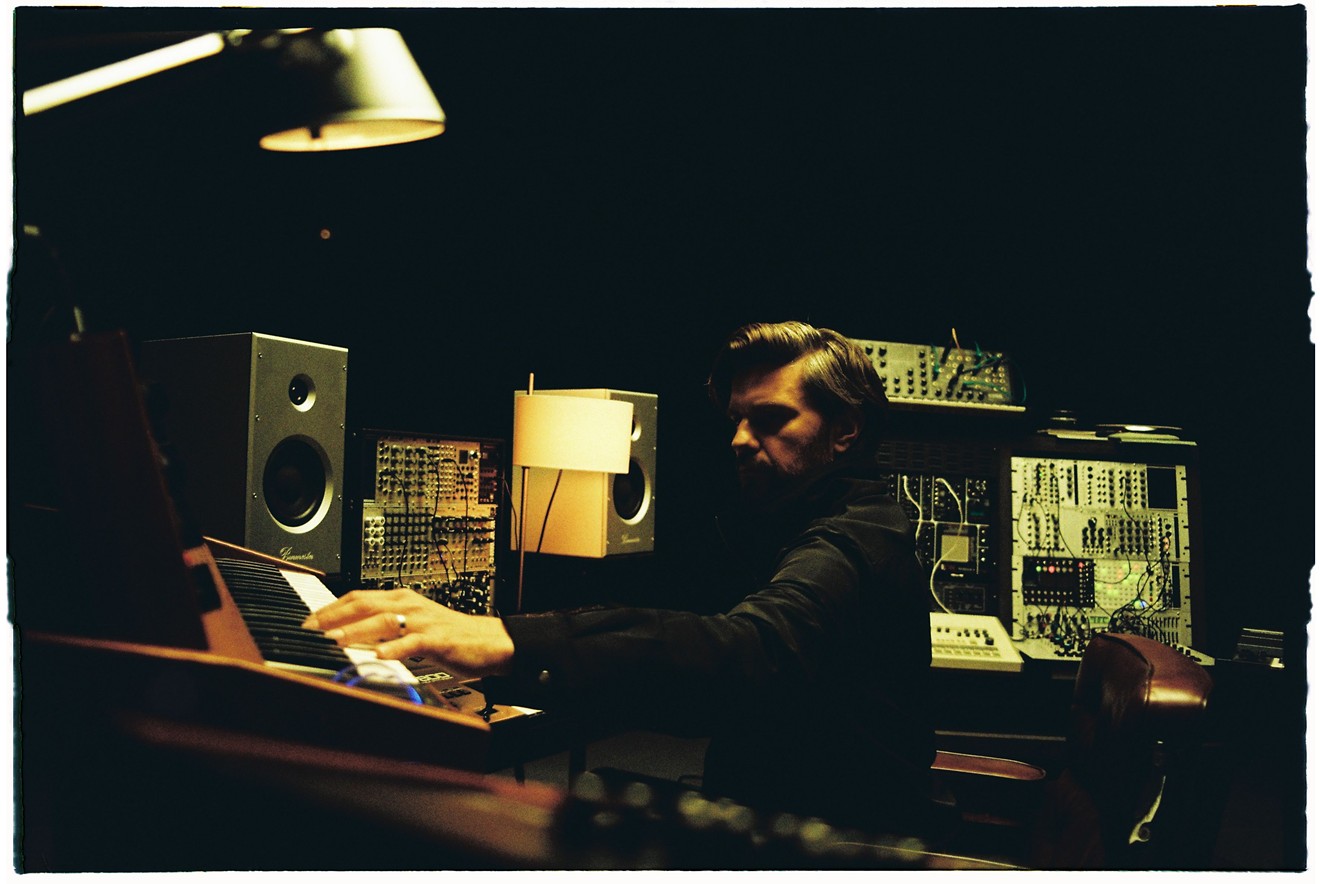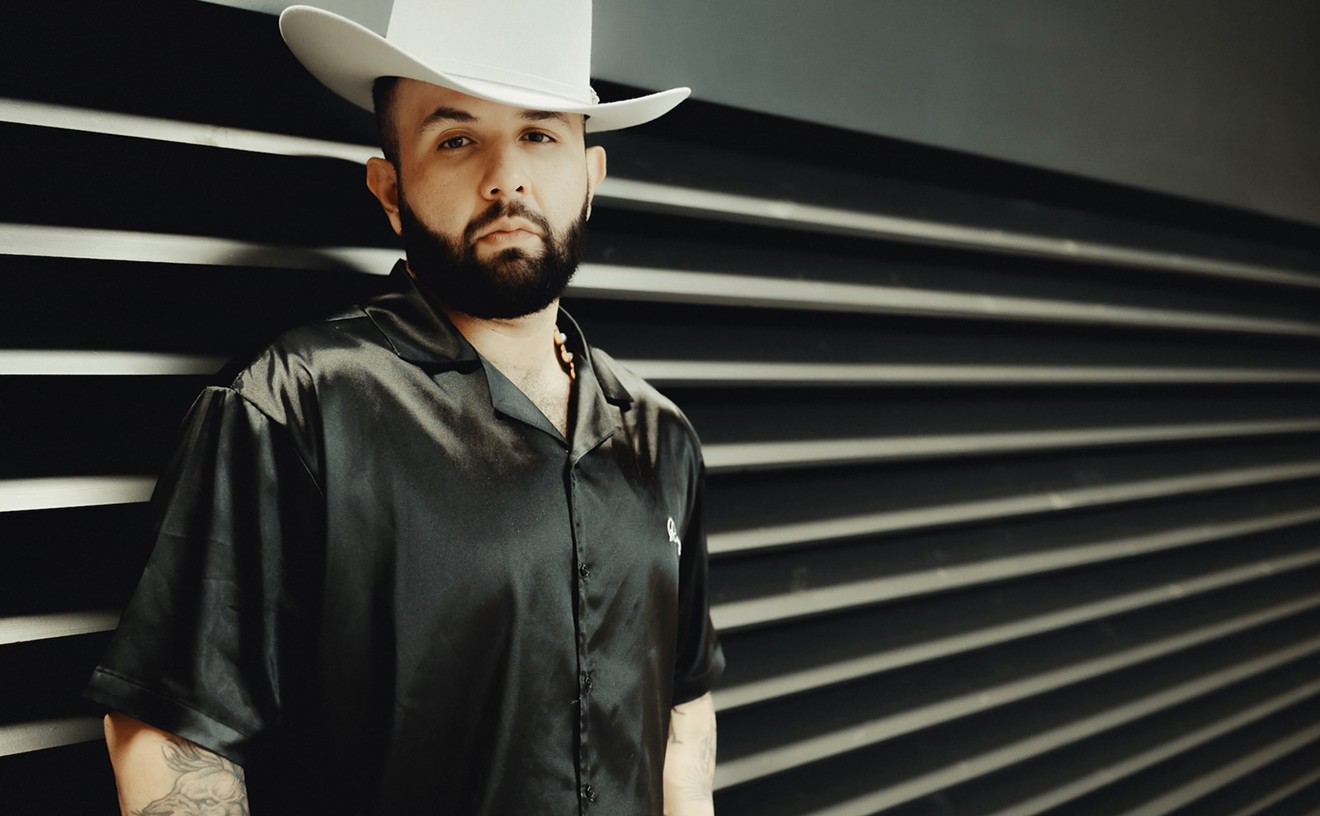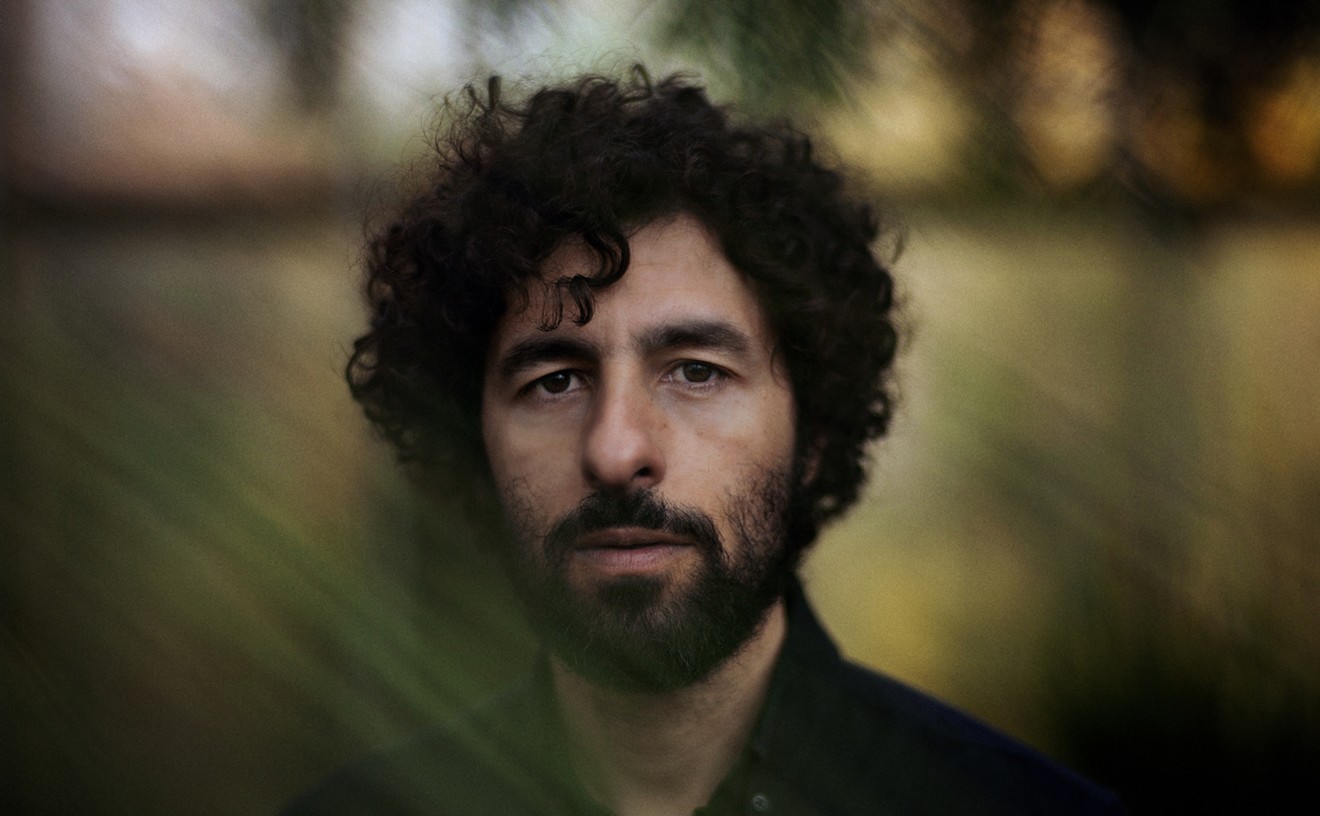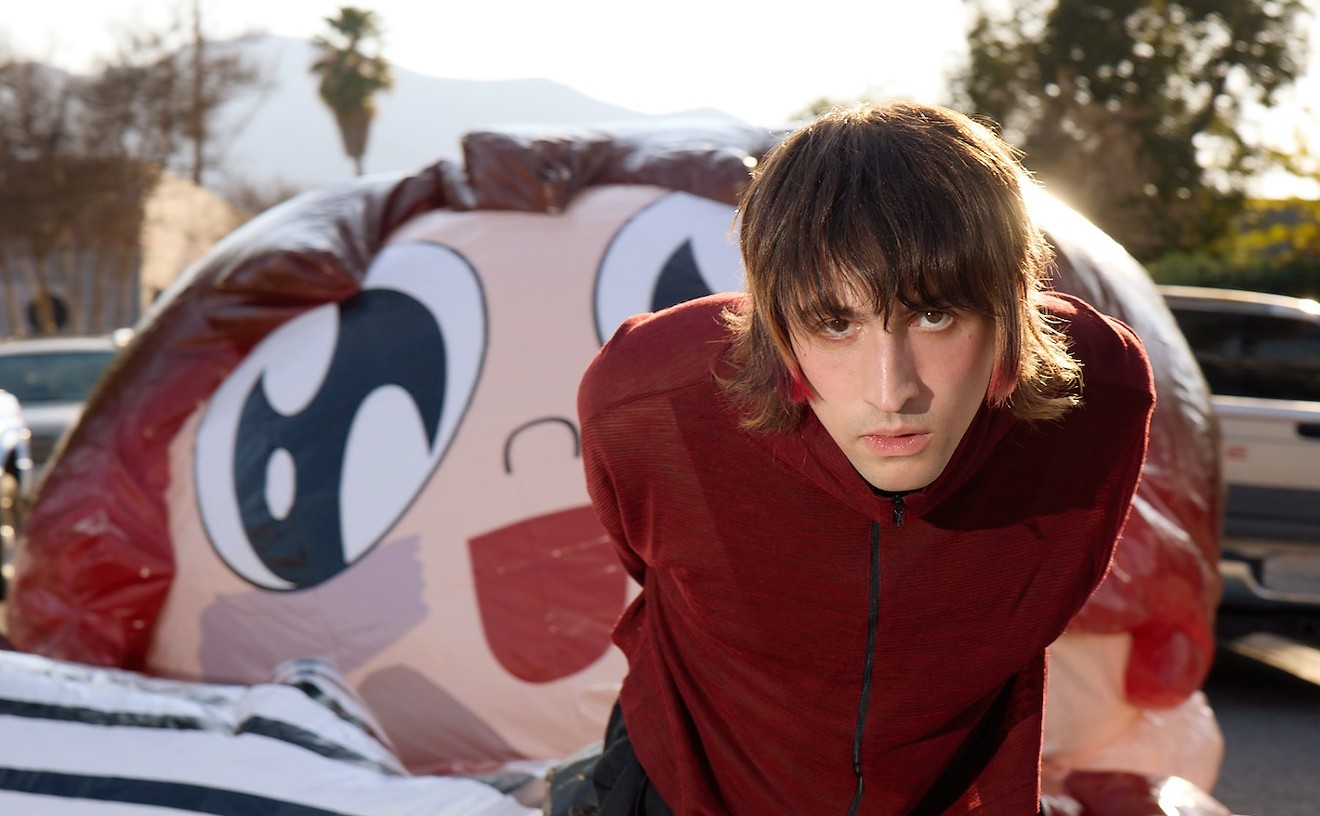Inside Olivier Mateu's home in Miami Springs, you aren't able to tell South Florida is in the midst of a torrential downpour that will lead to a once-in-a-thousand-year flood. An old Jaguar for sale is parked outside the home, while inside, a turntable and records sit on a shelf while Mateu's son's toys are scattered across the Spanish tile floor.
The producer, who creates music under the moniker Rodriguez Jr., is most at peace in his balmy home studio, where his vintage synthesizers are neatly stacked. "You can't do better than Japanese," he tells New Times while admiring his Roland Jupiter 6 synthesizer.
Mateu sips an espresso, ready to talk about his first album in five years, Feathers & Bones.
Born on France's southern coast in Montpellier, Mateu invaded the dance-music scene more than two decades ago. He started out spinning underground techno and house wherever he could before cofounding the electro duo the Youngsters with Gilles Escoffier in 1999.
The duo found a mentor in the legendary French producer Laurent Garnier who taught Mateu the fundamentals that would propel his solo career and his absolute fixation for live sets.
His nom de plume, Rodriguez Jr., is an homage to his paternal grandparents who fled the Franco regime in Spain and immigrated to France, where they dropped their last name to avoid racism and xenophobia. "My father doesn't even speak Spanish, but I'm still very proud of my Spanish roots," he adds.
Mateu embarked on a solo career in 2006, releasing four albums, including his latest, Feathers & Bones, set for release on May 26 on his newly launched imprint of the same name.
"It's always some kind of emergency from inside, and you feel like now is the time to make a statement," Mateu says of the process of making the album. "Business-wise, it doesn't make much sense anymore because people don't listen to albums anymore. But as an artist, I still feel this emergency and want to create a story where you know there is a beginning, middle, and end. This one is interesting because it's in between my Paris life and my new chapter in Miami."
Mateu and his family moved from Paris to South Florida earlier this year, and the pain of moving across continents took a toll. Somewhere between the middle of the Atlantic Ocean and the Port of Miami, some of his gear suffered catastrophic damage, ruining his most prized instruments. He combined the experience of a less-than-perfect move and the album's origins beginning amid the pandemic into ten tracks.
The title track kicks things off with a tropical rhythm floating in the ether and Mateu's twinkling synth work, followed by a sullen piano melody. The song ends with the sounds of waves hitting the shore, which can be interpreted as an ode to the beaches of southern France or his new home in Miami.
"I know the album doesn't stick to one sound," he says. "I know I might lose people, but at least I'm doing what I like. And I think that's very important." Indeed, the album spans melodic house, techno, ambient fixtures, and even some nods to trance if you close your eyes hard enough. This is one-half of Mateu's intention, but the other half comes from the album's many collaborators.
These include his wife, Liset Alea, a Cuban-American singer-songwriter who adds tranquility to Mateu's work with her voice. Another is multi-instrumentalist Giorgia Angiuli, who co-produced "Tuning the Moon," a heady, serene track that melds bass and melodies with serenity via piano riffs and luscious vocal work. "I have nothing but admiration for my colleagues," he adds.
Still, there isn't a real financial incentive for Mateu to produce the album — so then, why make music at all?
The answer is simple: The album isn't for him. It never was.
"For me, the most beautiful thing is when people create their own memories with my music, you know, for instance, I have people reaching out and saying, 'We got married after listening to your music' or 'We experienced the beautiful moment with my wife listening to your music,'" he says. "For me, that's the most important. When music is not something I can control anymore, and, you know, it's just something in the air, and people can create their own memories. And this is the most beautiful."
Mateu's first time in Miami was in 2008, probably for a show at Treehouse or the late Electric Pickle — he can't remember. "I was instantly hooked. I just love the city and the pace," he adds.
While he's witnessed the city change, including its nightlife scene, he will never sacrifice his live sets for anything.
"I really enjoyed doing something different in the '90s," he says. "Bringing synths and creating music in front of the people. It was exciting. Right now, I have a different setup: computers, drum machines, and I export my music in a way to control it internally based on the crowd reactions."
Beyond live sets, acts like Stephan Bodzin, Monolink, and Booka Shade have sought Mateu's expertise for remixes. Back at his home studio, displayed on his computer monitor are the inner workings of a new remix he's working on for release in the near future.
"I'm really slow with releasing, actually. It takes a lot of time to find the right angles and right sounds and make the eventual right decisions," he says.
Still, Mateu expects to release more remixes and a vinyl edition of Feathers & Bones. He's also flirting with the idea of composing a children's album of ambient sounds to help the little ones fall asleep. "When my son was a few months old, I created a lot of sounds and sound waves to putting him to bed, and it worked," he adds.
There's not too much to be sentimental about when Mateu discussed the last 20 years of his career.
"I think nostalgia can be a very dangerous poison," he confesses. "But, for instance, I love Boards of Canada because of the memories with it. I do like a little bit of nostalgia because it brings some romanticism to music."
The rain outside holds up as the interview comes to a close. Mateu walks to his turntable to play Boards of Canada's Music Has the Right to Children. During his transatlantic move, water damage warped the record's sleeve. "I think it looks pretty cool," Mateu says, smiling.
[
{
"name": "Air - MediumRectangle - Inline Content - Mobile Display Size",
"component": "19274298",
"insertPoint": "2",
"requiredCountToDisplay": "2"
},{
"name": "Editor Picks",
"component": "17482312",
"insertPoint": "4",
"requiredCountToDisplay": "1"
},{
"name": "Inline Links",
"component": "18711090",
"insertPoint": "8th",
"startingPoint": 8,
"requiredCountToDisplay": "7",
"maxInsertions": 25
},{
"name": "Air - MediumRectangle - Combo - Inline Content",
"component": "17482310",
"insertPoint": "8th",
"startingPoint": 8,
"requiredCountToDisplay": "7",
"maxInsertions": 25
},{
"name": "Inline Links",
"component": "18711090",
"insertPoint": "8th",
"startingPoint": 12,
"requiredCountToDisplay": "11",
"maxInsertions": 25
},{
"name": "Air - Leaderboard Tower - Combo - Inline Content",
"component": "17482313",
"insertPoint": "8th",
"startingPoint": 12,
"requiredCountToDisplay": "11",
"maxInsertions": 25
}
]












